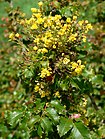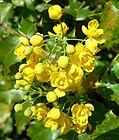Note: This is a project under development. The articles on this wiki are just being initiated and broadly incomplete. You can Help creating new pages.
Difference between revisions of "Mahonia pinnata - Mahonia pinnata"
Chaithrika (talk | contribs) (+Common names) |
|||
| (14 intermediate revisions by 3 users not shown) | |||
| Line 1: | Line 1: | ||
[[File:Mahonia pinnata 1.jpg|thumb|right|''Mahonia pinnata'', ''California barberry,'']] | [[File:Mahonia pinnata 1.jpg|thumb|right|''Mahonia pinnata'', ''California barberry,'']] | ||
| + | '''Mahonia pinnata''' is a species of shrub in the barberry family. It is native to the west coast of North America from British Columbia to Baja California. | ||
| − | + | ==Uses== | |
| + | {{Uses|Stomach ulcer}}, {{Uses|Gastric problems}}, {{Uses|Stomach upset}}, {{Uses|Infections}}, {{Uses|Skin disorder}}, {{Uses|Psoriasis}}, {{Uses|Pimples}}, {{Uses|Diarrhea}}. | ||
| − | + | ==Parts Used== | |
| + | {{Parts Used|Leaves}}. | ||
| − | == | + | ==Chemical Composition== |
| − | + | Berberis aquifolium contains berberine, a yellow alkaloid (see Hydrastis), berbamine, and oxyacanthine, both white alkaloids, and phytosterin, gum, and sugar. The flowers contain, in addition to the above alkaloids, volatile oil, and the berries contain malic acid.<ref name="chemical composition"/> | |
| − | |||
| − | == | + | ==Common names== |
| + | {{Common names|kn=|ml=|sa=|ta=|te=|hi=Wavyleaf barberry|en=Mahonia pinnata, Shinyleaf mahonia}} | ||
| − | + | ==Properties== | |
| + | Reference: Dravya - Substance, Rasa - Taste, Guna - Qualities, Veerya - Potency, Vipaka - Post-digesion effect, Karma - Pharmacological activity, Prabhava - Therepeutics. | ||
| + | ===Dravya=== | ||
| − | == | + | ===Rasa=== |
| − | + | ===Guna=== | |
| − | == | + | ===Veerya=== |
| − | *[https:// | + | ===Vipaka=== |
| + | |||
| + | ===Karma=== | ||
| + | |||
| + | ===Prabhava=== | ||
| + | |||
| + | ==Habit== | ||
| + | {{Habit|Herb}} | ||
| + | |||
| + | ==Identification== | ||
| + | ===Leaf=== | ||
| + | {{Leaf|Simple|alternate|Mahonia pinnata's foliage color is green and type is evergreen}}<ref name="Leaf"/> | ||
| + | |||
| + | ===Flower=== | ||
| + | {{Flower|Unisexual|2-4cm long|Yellow|5-20|Flowers Season is June - August}} | ||
| + | |||
| + | ===Fruit=== | ||
| + | {{Fruit|Simple|7–10 mm|Mahonia pinnata's fruit is edible||many}} | ||
| + | |||
| + | ===Other features=== | ||
| + | |||
| + | ==List of Ayurvedic medicine in which the herb is used== | ||
| + | * [[Vishatinduka Taila]] as ''root juice extract'' | ||
| + | |||
| + | ==Where to get the saplings== | ||
| + | ==Mode of Propagation== | ||
| + | {{Propagation|Seeds}}, {{Propagation|Cuttings}}. | ||
| + | |||
| + | ==How to plant/cultivate== | ||
| + | Landscape Uses:Border, Foundation, Ground cover, Massing. An easily grown plant, it thrives in any good garden soil<ref name="How to plant/cultivate"/> | ||
| + | |||
| + | ==Commonly seen growing in areas== | ||
| + | {{Commonly seen|Forest}}, {{Commonly seen|Woodland}}, {{Commonly seen|Chaparral}}. | ||
| + | |||
| + | ==Photo Gallery== | ||
| + | <gallery class="left" caption="" widths="140px" heights="140px"> | ||
| + | Image:Mahonia-pinnata-habit.JPG|Habit | ||
| + | Image:Mahonia-pinnata-foliage.JPG|Foliage and flowers | ||
| + | Image:Mahonia-pinnata-flowers.JPG|Flower clusters | ||
| + | Image:Mahonia pinnata 1.jpg | ||
| + | Image:Mahonia pinnata 2.jpg | ||
| + | Image:Mahonia pinnata 3.jpg | ||
| + | </gallery> | ||
| + | |||
| + | ==References== | ||
| + | |||
| + | <references> | ||
| + | <ref name="chemical composition">[https://www.henriettes-herb.com/eclectic/kings/berberis-aqui.html "constituents"]</ref> | ||
| + | |||
| + | <ref name="Leaf">[https://www.laspilitas.com/nature-of-california/plants/774--mahonia-pinnata "plant description"]</ref> | ||
| + | |||
| + | <ref name="How to plant/cultivate">[https://www.pfaf.org/user/Plant.aspx?LatinName=Mahonia+pinnata "Cultivation details"]</ref> | ||
| + | </references> | ||
| + | |||
| + | ==External Links== | ||
| + | * [https://www.cabi.org/isc/datasheet/32269 Mahonia pinnata on cabi.org] | ||
| + | * [https://www.sciencedirect.com/topics/medicine-and-dentistry/berberis Mahonia pinnata on science direct] | ||
| + | * [https://www.webmd.com/vitamins/ai/ingredientmono-493/oregon-grape Mahonia pinnata on web md.com] | ||
[[Category:Herbs]] | [[Category:Herbs]] | ||
| + | [[Category:Ayurvedic herbs that don't have flower, fruit and leaf photos]] | ||
| + | [[Category:Ayurvedic herbs that don't have seed photos]] | ||
| + | [[Category:Berberidaceae]] | ||
Latest revision as of 13:21, 25 November 2020
Mahonia pinnata is a species of shrub in the barberry family. It is native to the west coast of North America from British Columbia to Baja California.
Contents
- 1 Uses
- 2 Parts Used
- 3 Chemical Composition
- 4 Common names
- 5 Properties
- 6 Habit
- 7 Identification
- 8 List of Ayurvedic medicine in which the herb is used
- 9 Where to get the saplings
- 10 Mode of Propagation
- 11 How to plant/cultivate
- 12 Commonly seen growing in areas
- 13 Photo Gallery
- 14 References
- 15 External Links
Uses
Stomach ulcer, Gastric problems, Stomach upset, Infections, Skin disorder, Psoriasis, Pimples, Diarrhea.
Parts Used
Chemical Composition
Berberis aquifolium contains berberine, a yellow alkaloid (see Hydrastis), berbamine, and oxyacanthine, both white alkaloids, and phytosterin, gum, and sugar. The flowers contain, in addition to the above alkaloids, volatile oil, and the berries contain malic acid.[1]
Common names
| Language | Common name |
|---|---|
| Kannada | |
| Hindi | Wavyleaf barberry |
| Malayalam | |
| Tamil | |
| Telugu | |
| Marathi | NA |
| Gujarathi | NA |
| Punjabi | NA |
| Kashmiri | NA |
| Sanskrit | |
| English | Mahonia pinnata, Shinyleaf mahonia |
Properties
Reference: Dravya - Substance, Rasa - Taste, Guna - Qualities, Veerya - Potency, Vipaka - Post-digesion effect, Karma - Pharmacological activity, Prabhava - Therepeutics.
Dravya
Rasa
Guna
Veerya
Vipaka
Karma
Prabhava
Habit
Identification
Leaf
| Kind | Shape | Feature |
|---|---|---|
| Simple | alternate | Mahonia pinnata's foliage color is green and type is evergreen |
Flower
| Type | Size | Color and composition | Stamen | More information |
|---|---|---|---|---|
| Unisexual | 2-4cm long | Yellow | 5-20 | Flowers Season is June - August |
Fruit
| Type | Size | Mass | Appearance | Seeds | More information |
|---|---|---|---|---|---|
| Simple | 7–10 mm | Mahonia pinnata's fruit is edible | many | {{{6}}} |
Other features
List of Ayurvedic medicine in which the herb is used
- Vishatinduka Taila as root juice extract
Where to get the saplings
Mode of Propagation
How to plant/cultivate
Landscape Uses:Border, Foundation, Ground cover, Massing. An easily grown plant, it thrives in any good garden soil[3]
Commonly seen growing in areas
Photo Gallery
References
External Links
- Ayurvedic Herbs known to be helpful to treat Stomach ulcer
- Ayurvedic Herbs known to be helpful to treat Gastric problems
- Ayurvedic Herbs known to be helpful to treat Stomach upset
- Ayurvedic Herbs known to be helpful to treat Infections
- Ayurvedic Herbs known to be helpful to treat Skin disorder
- Ayurvedic Herbs known to be helpful to treat Psoriasis
- Ayurvedic Herbs known to be helpful to treat Pimples
- Ayurvedic Herbs known to be helpful to treat Diarrhea
- Herbs with Leaves used in medicine
- Herbs with common name in Hindi
- Herbs with common name in English
- Habit - Herb
- Index of Plants which can be propagated by Seeds
- Index of Plants which can be propagated by Cuttings
- Herbs that are commonly seen in the region of Forest
- Herbs that are commonly seen in the region of Woodland
- Herbs that are commonly seen in the region of Chaparral
- Herbs
- Ayurvedic herbs that don't have flower, fruit and leaf photos
- Ayurvedic herbs that don't have seed photos
- Berberidaceae






